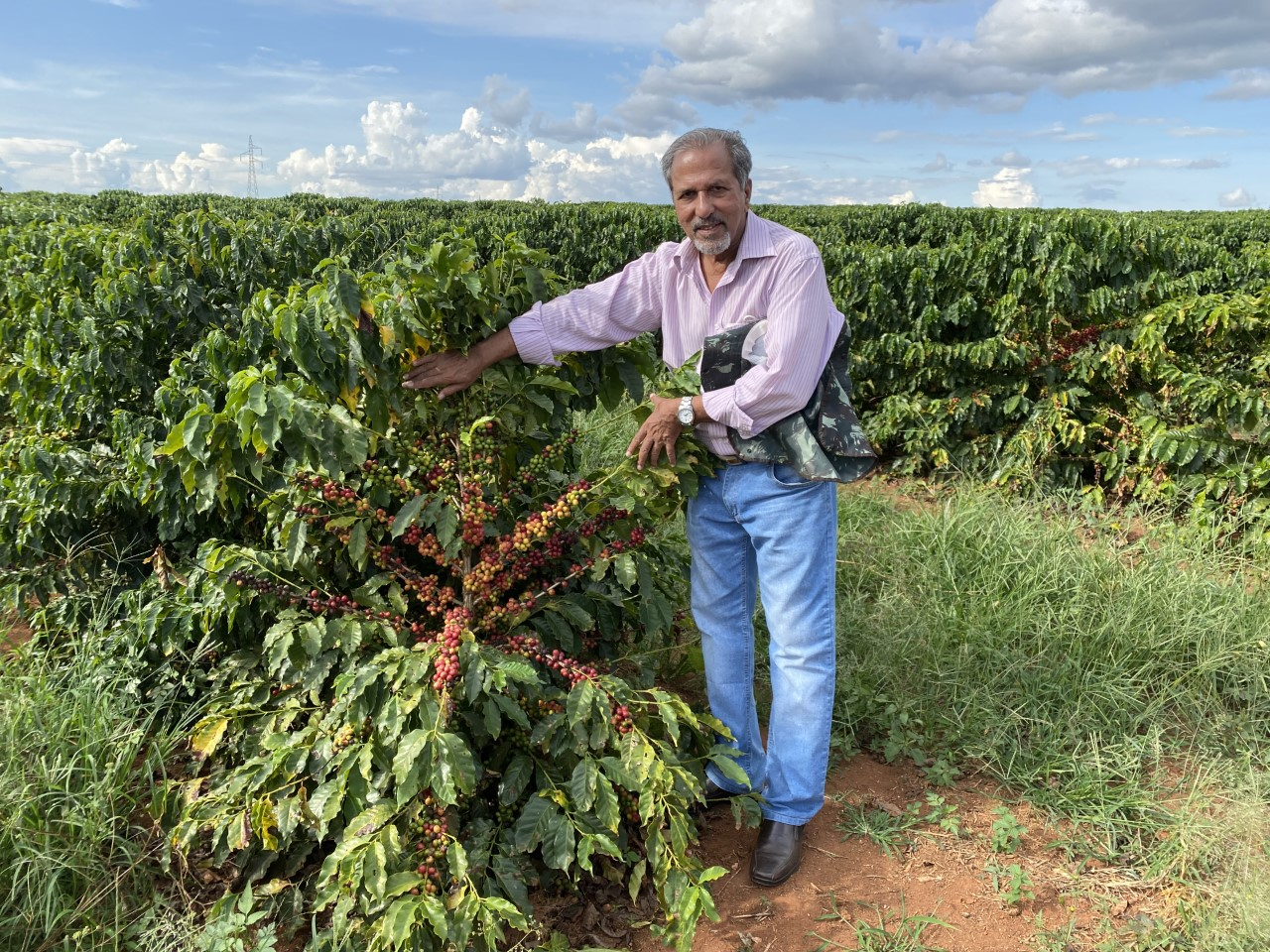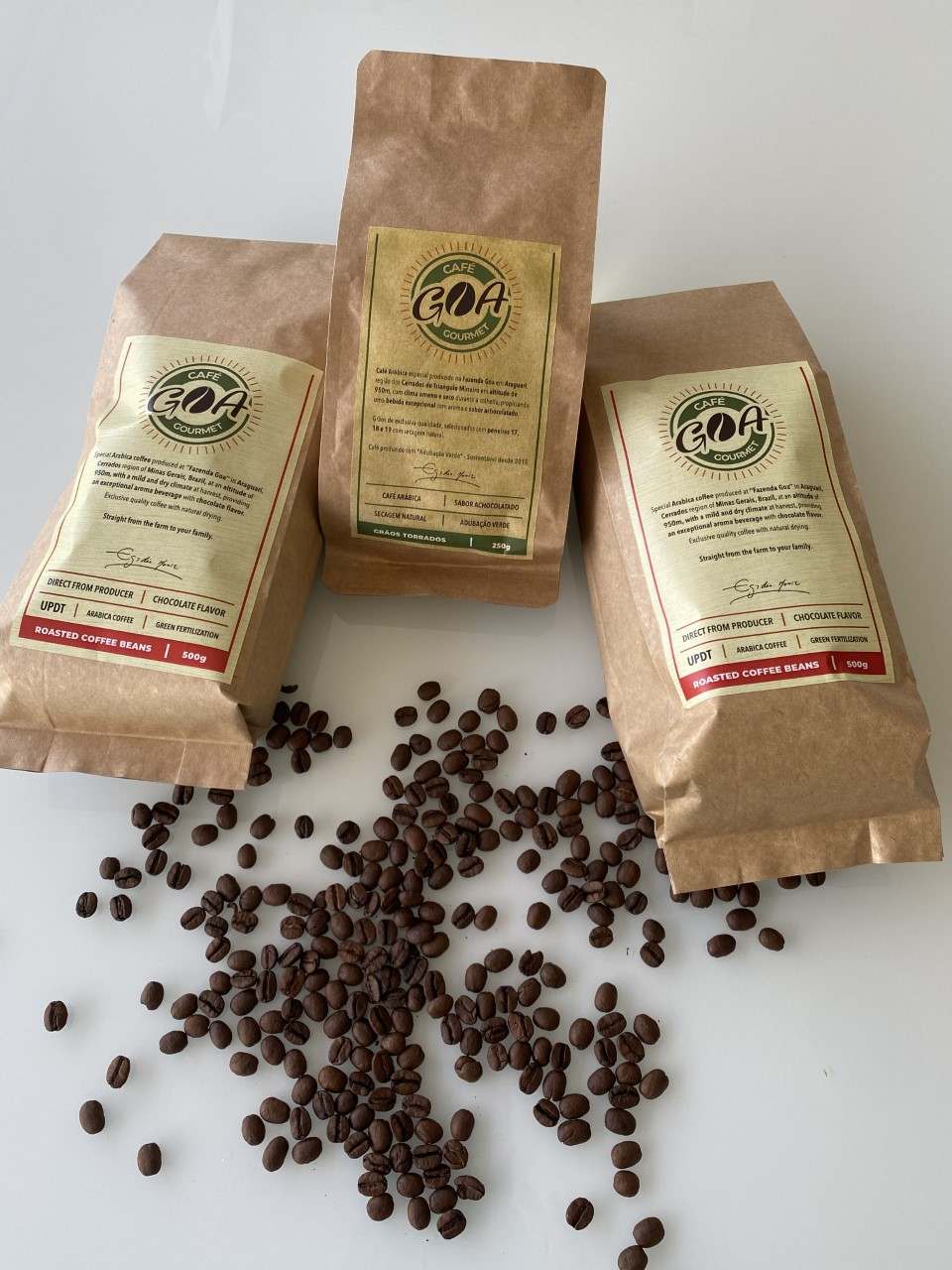
Egidio Moniz at his ‘Fazenda Goa’ farm in Araguari, Brazil.
Egidio Moniz loves his coffee. He obsesses over its body, flavour, and acidity. It has enabled him to meet many and varied people.
No, it’s not what you may be thinking. He is not your average millennial, clutching a cuppa joe.
Moniz is a coffee producer in Brazil. “Coffee production is an art, it obliges you to become a better farmer”, he says. “My brand of coffee is called ‘Café Goa’, and my farm is called ‘Fazenda Goa’.”
Hailing from Curtorim, Moniz’s diasporic journey spans Asia, Europe, and South America, finally settling down for a coffee farm in Araguari, Brazil as a post-retirement occupation. His earliest childhood memories are of the Robusta coffee-bean trees in his grandmother’s home, where he spent his early years.
As a nine-year-old, Moniz recalls the Goa-Bombay journey with his father, in 1957. He says, “It involved going by bus from our home in Curtorim to the Goa border, staying overnight at the border, and taking another bus from the other side of the border all the way to Bombay.” It was, at the time, an international border.
At St Mary’s School (founded in 1864), a private Catholic secondary school for boys in Byculla, Bombay, Moniz recalls, “My first principal was Fr Donald Donnelly, an Irishman, well known for his love of sports. I participated actively in football, hockey, cricket and athletics, but excelled in none. Fr Ribes, Fr Juan, Fr Aran and Fr Aloysius Pereira had a tremendous impact on my life.”
This Jesuit impact continues to remain embedded within the Moniz family.
In 1969, Egidio Moniz relocated to Pune to pursue a 4-years BSc in Agriculture. He excelled in academics in the first year, and then discovered life beyond academics! He shifted off-campus, got himself a bicycle, made friends with a group of Goan returnees from East Africa, and joined the youth theatre group started by Cyril Desbruslais SJ, eventually performing in a couple of plays written and directed by the Jesuit priest.
In 1973, Moniz completed his graduation and returned to Goa and handled extension work with the Dept of Agriculture, taking technical knowledge to the farmers.
Invited by college senior, Gill Rebello from Divar, who had moved to Brazil a few years earlier, he left Goa for Brazil in 1975, via France.
“It was a difficult move. I did not know Portuguese, no friends, moreover I couldn’t drive a car. But I fell in love with the people of Brazil,” he reminiscences.
Employed at Imperial Chemical Industries (later acquired by AstraZeneca, and Syngenta), he moved across seven different locations in Brazil: Maringa in the State of Parana, Campo Mourao also in Parana, Santo Angelo and Passo Fundo in Rio Grande de Sul, and three postings in the State of Sao Paulo: Ribeirao Preto, Campinas, finally closing a long and successful career in Sao Paulo city. His professional career spanned sales, research, tech, and stewardship in sustainability. He retired in 2010-11.
After retirement, Moniz began to work full-time on his 32 hectares of land at Araguari in western Minas Gerais. Presently, he has 4,000 Arabica plants per hectare, and a production capacity of 1,500 sacks of coffee per year.
India and Brazil are both tropical countries with huge climatic and crop similarities.
“Two years ago, I did some consultancy work in coffee in Karnataka. The average production of Arabica coffee among leading farmers in Karnataka is 12 sacks of coffee per hectare per year as compared to 30 sacks per hectare in Brazil. The coffee farmer in India also makes some money with intercropping of pepper and forest wood from the same coffee area. All the same a big difference with per hectare earnings,” Moniz says.
Moniz is now preoccupied with what he calls the ‘Curtorim Project’.
“Even though I have been in Brazil for 45 years and love this country, I miss India and Goa in a big way. I would like to do something for my beautiful village, Curtorim. I want to encourage a love for 6 very important and crucial plants as a supplement to the daily nutrients: Drumsticks (moringa oleifera), Grapes, Acerola/Antilean cherry (malpighia emarginata), Tapioca (manihot esculenta), Coffee (Robusta) and Tabebuia, a beautiful flowering tree, food for the soul,” he says.
In 2020, The Agronomists Association of the State of Sao Paulo honoured Egidio Moniz with a medal for “Outstanding Agronomist in Agricultural Sustainability”.
For someone, who remembers vividly how his grandmother processed paddy into rice, the threshing by two cattle that would walk around a pole separating the grain from its stalk, boiling the paddy in large vessels, and the smell of the paddy that connects him to his home – Egidio Moniz has blazed a trail with Café Goa.
 The Café Goa brand of coffee produced at the ‘Fazenda Goa’ farm in Araguari, Brazil.
The Café Goa brand of coffee produced at the ‘Fazenda Goa’ farm in Araguari, Brazil.
(The writer is an organisational strategist, operations leader, and mentor to multi-cultural teams)